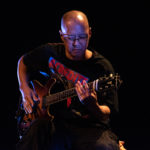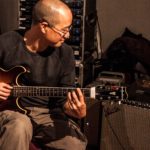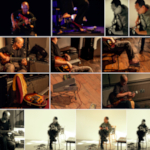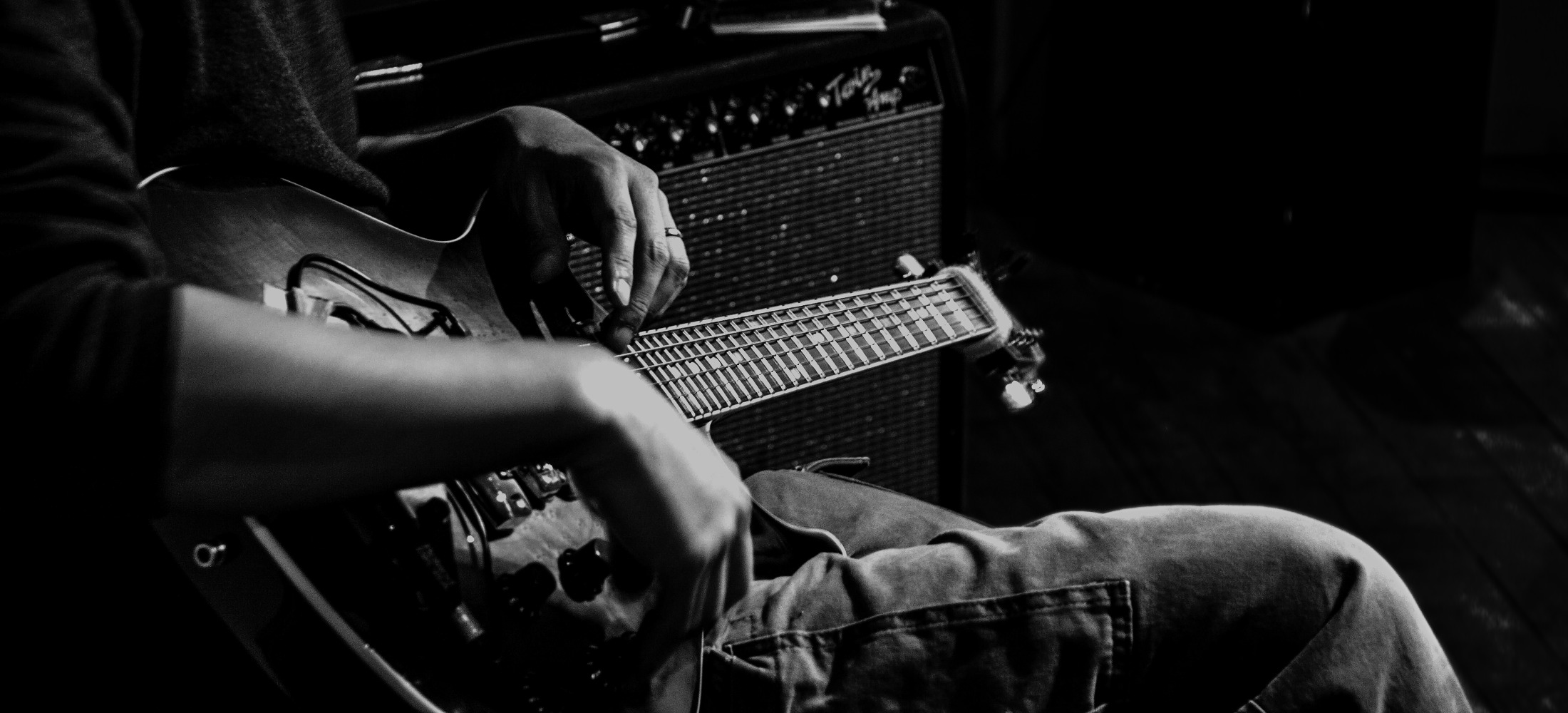Name: Han-earl Park.*
Family name: Park.
Instrument: Guitar.†
Pronouns: He/him.
Nationality: American.
Identifies as: Asian-American, and Korean-American.
Race: Asian.
Ethnicity/heritage: Korean.
* Lowercase ‘e,’ hyphen between first two syllables, and no spaces either side of the hyphen.
† Not electric guitar, not guitar and electronics, not guitar and pedals, et cetera, et cetera.
biography: Han-earl Park
86 words
Shifting and switching from No Wave skronk to interstellar guitarist-as-drummer virtuosity, from stampedes of miniature Pomeranian Buffalos to All-You-Zombies heterophonies, Han-earl Park (박한얼) has been performing beautifully messy, joyously difficult, ambiguous and discordant improvised musics for over twenty years. Park is the mastermind behind ensembles including Eris 136199 with Catherine Sikora and Nick Didkovsky; Juno 3 with Lara Jones and Pat Thomas; and Gonggong 225088 with Yorgos Dimitriadis and Camila Nebbia; and performs as part of a duo with Richard Barrett.
138 words
Shifting and switching from No Wave skronk to interstellar guitarist-as-drummer virtuosity, from stampedes of miniature Pomeranian Buffalos to All-You-Zombies heterophonies, Han-earl Park (박한얼) has been performing beautifully messy, joyously difficult, ambiguous and discordant improvised musics for over twenty years.
Park is the mastermind behind ensembles including Eris 136199 with Catherine Sikora and Nick Didkovsky; Juno 3 with Lara Jones and Pat Thomas; and Gonggong 225088 with Yorgos Dimitriadis and Camila Nebbia; and performs as part of a duo with Richard Barrett. His ensembles have appeared at festivals including Jazz em Agosto (Lisbon), EFG London Jazz Festival, Brilliant Corners (Belfast), Freedom of the City (London), ISIM (New York), dialogues festival (Edinburgh) and Sonic Acts (Amsterdam). Park’s recordings have been released by labels including NEWJAiM, Ramble Records, SLAM Productions, Creative Sources and DUNS Limited Edition.
200 words
Shifting and switching from No Wave skronk to interstellar guitarist-as-drummer virtuosity, from stampedes of miniature Pomeranian Buffalos to All-You-Zombies heterophonies, Han-earl Park (박한얼) has been performing beautifully messy, joyously difficult, ambiguous and discordant improvised musics for over twenty years.
Park is drawn to the noisy poetry of interactive play; its pleasurable complexities, and joyous discords. He has become increasingly fascinated by the possibilities of refracting the improvisative through narrative tropes and forms, sometimes transposing techniques from fiction and cinema. He seeks musics that are ‘inconvenient,’ that resist easy resolution, and seeks practices that, despite understanding that connection is, in a way, unknowable, take seriously consent, affinity, agency, trust and compassion.
Park is the mastermind behind ensembles including Eris 136199 with Catherine Sikora and Nick Didkovsky; Juno 3 with Lara Jones and Pat Thomas; and Gonggong 225088 with Yorgos Dimitriadis and Camila Nebbia; and performs as part of a duo with Richard Barrett. His ensembles have appeared at Jazz em Agosto (Lisbon), EFG London Jazz Festival, Brilliant Corners (Belfast), Freedom of the City (London), ISIM (New York) and Sonic Acts (Amsterdam). Park’s recordings have been released by NEWJAiM, Ramble Records, SLAM Productions, and DUNS Limited Edition.
288 words
Shifting and switching from No Wave skronk to interstellar guitarist-as-drummer virtuosity, from stampedes of miniature Pomeranian Buffalos to All-You-Zombies heterophonies, Han-earl Park (박한얼) has been performing beautifully messy, joyously difficult, ambiguous and discordant improvised musics for over twenty years.
Park is drawn to the noisy poetry of interactive play; its pleasurable complexities, and joyous discords. He has become increasingly fascinated by the possibilities of refracting the improvisative through narrative tropes and forms, sometimes transposing techniques from fiction and cinema. He seeks musics that are ‘inconvenient,’ that resist easy resolution, and seeks practices that, despite understanding that connection is, in a way, unknowable, take seriously consent, affinity, agency, trust and compassion.
Park is the mastermind behind ensembles including Eris 136199 with Catherine Sikora and Nick Didkovsky, Juno 3 with Lara Jones and Pat Thomas, and Gonggong 225088 with Yorgos Dimitriadis and Camila Nebbia. Park also performs as part of a duo with Richard Barrett, and as part of Thoughts of Trio’s dark extemporizations, the avant-disco of QLH, and The Names’ hyper-lyricism. He has performed with Wadada Leo Smith, Paul Dunmall, Pauline Oliveros, Charles Hayward, Mark Sanders, Lol Coxhill, Louise Dam Eckardt Jensen, Evan Parker, Ingrid Laubrock, Josh Sinton and Franziska Schroeder. His constructions and compositions include ‘Bandwidth,’ a videographic work for improvisation; the online #lockdownminiature series; the machine improviser io 0.0.1 beta++; and Metis 9, a playbook of improvisative tactics.
His ensembles have appeared at festivals including Jazz em Agosto (Lisbon), EFG London Jazz Festival, Brilliant Corners (Belfast), Freedom of the City (London), ISIM (New York), dialogues festival (Edinburgh) and Sonic Acts (Amsterdam). Park’s recordings have been released by labels including NEWJAiM, Ramble Records, SLAM Productions, Creative Sources and DUNS Limited Edition.
495 words
Shifting and switching from No Wave skronk to interstellar guitarist-as-drummer virtuosity, from stampedes of miniature Pomeranian Buffalos to All-You-Zombies heterophonies, Han-earl Park (박한얼) has been performing beautifully messy, joyously difficult, ambiguous and discordant improvised musics for over twenty years. Described as “a musical philosopher” and “a delightful shape-shifter” (Brian Morton, Point of Departure), and as a guitarist who utilizes “the totality of the guitar’s sonorities” (Stanley Zappa, The New York City Jazz Record), he has performed in clubs, theaters, art galleries, concert halls, and (ad-hoc) alternative spaces across Europe, Korea and the USA.
Park is drawn to the noisy poetry of interactive play; its pleasurable complexities, and joyous discords. He has become increasingly fascinated by the possibilities of refracting the improvisative through narrative tropes and forms, sometimes transposing techniques from fiction and cinema. He seeks musics that are ‘inconvenient,’ that resist easy resolution, and seeks practices that, despite understanding that connection is, in a way, unknowable, take seriously consent, affinity, agency, trust and compassion.
Park is the mastermind behind ensembles including Eris 136199 with Catherine Sikora and Nick Didkovsky, Juno 3 with Lara Jones and Pat Thomas, and Gonggong 225088 with Yorgos Dimitriadis and Camila Nebbia. Park also performs as part of a duo with Richard Barrett, and as part of Thoughts of Trio’s dark extemporizations, the avant-disco of QLH, and The Names’ hyper-lyricism. He has performed with Wadada Leo Smith, Paul Dunmall, Pauline Oliveros, Charles Hayward, Mark Sanders, Lol Coxhill, Louise Dam Eckardt Jensen, Evan Parker, Ingrid Laubrock, Josh Sinton and Franziska Schroeder. His constructions and compositions include ‘Bandwidth,’ a videographic work for improvisation; the online #lockdownminiature series; the machine improviser io 0.0.1 beta++; and Metis 9, a playbook of improvisative tactics.
He has studied with improviser-composers Wadada Leo Smith, Richard Barrett, Annette Krebs, Joel Ryan, Mark Trayle, Chick Lyall and David Rosenboom, composers Marina Adamia and Clarence Barlow, and interactive media artist Sara Roberts. In addition to giving workshops, lectures and one-to-one lessons, Park taught improvisation at University College Cork (2006–2011, 2017), and founded and curated Stet Lab (2007–2011), an alternatively pedagogical space for improvised music.
His ensembles have appeared at festivals including Jazz em Agosto (Lisbon), EFG London Jazz Festival, Brilliant Corners (Belfast), Freedom of the City (London), ISIM (New York), dialogues festival (Edinburgh) and Sonic Acts (Amsterdam); and he has collaborated in projects featured at festivals including Sonorities (Belfast) and CEAIT (Los Angeles). In 2021, NEWJAiM Recordings released Of Life, Recombinant, Park’s exploration of the solo guitar as smithereened and recomposed through the studio, and, in 2024, Waveform Alphabet will release Gonggong 225088’s spaghetti junction of gentle noise. Park’s recordings have also been released by labels including Ramble Records, SLAM Productions, Creative Sources and DUNS Limited Edition. He is recipient of grants from Musikfonds, initiative neue musik berlin, the Arts Council of Ireland, Music Network, Culture Ireland, and the Berlin Senate Department for Culture and Community.
promo/press images
Press/promo image [.jpg] |
Alternative image [.jpg] |
Gallery |
press and quotes
“Guitarist Han-earl Park is a musical philosopher…. Expect unexpected things from Park, who is a delightful shape-shifter….”
— Brian Morton (Point of Departure)
“A colorful, sometimes violent and revelatory listening experience that infuses modern aesthetics with the spirit of the ancient…. Ancient and primordial with ideas as open as the night sky….”
— John Morrison (Jazz Right Now)
“Wonderful energy, constant motion, and roiling in noise. And immense amount of grit and power.”
—Corey Mwamba (Freeness, BBC Radio 3)
『それはあたかも地球外の異境から到来した明滅する運動エネルギーによって脳外科手術を施されるような驚喜の頭脳改革体験である。』
— Takeshi Goda (JazzTokyo)
“Park… may just have the specter of drumming giant Rashied Ali guiding his hands. His fingers, palms and wrists tirelessly bounce, skitter, smear, stroke, strum, hammer-on, pull-off and thump his solid-body electric. Considering the rapidity of his technique, the effect is not simply percussive, but utterly drumkit-like and a liberated kit at that….”
— John Pietaro (The New York City Jazz Record)
“Long, thrilling sections of beauty fold into chilly, dread-inducing dreamscapes….”
— Lee Rice Epstein (Free Jazz)
“We listen, we wait. Breathing deeply, relaxed enough yet ready to be sucked in by some vortex of illusion. We absorb the blows of sudden mutations connected by threads of metallic (in)coherence…. Each spin adds further layers of interpretation, not to mention the sheer aural thrill.”
—Massimo Ricci (Touching Extremes)
“The perfect distillation of uneasy listening.”
— Dave Foxall (a Jazz Noise)
“In its representation of real-time activity that ruminates on its material, it is as if it provides a glimpse into the improvising process, whose hushed reality of painstaking practice might often be misinterpreted as something closer to strokes of inspiration out of the ether. In between chaos and composure, it is something closer to the complexity of life.”
— Keith Prosk (harmonic series)
“Ein glorioser Bastard aus Noise und süßer Träumerei.”
— Rigobert Dittmann (Bad Alchemy)
“Though short, percussive, hard-to-notate sounds dominate Han-earl Park’s sound, he does utilize the totality of the guitar’s sonorities—just not in the proportions demanded by the nostalgic (retrospective, reactionary, etc.) owners of major media….”
— Stanley Zappa (The New York City Jazz Record)
“Kaleidoscopic music, a rubato flux of superimposed noises in which lightning-fast progression from one galvanising sound event (noise thru silence) to another….”
— Tim Owen (Dalston Sound)
“Park is the one to pay close attention to… the development of his ideas is fascinating and very logical….”
— Jeph Jerman (The Squid’s Ear)
“Pieces of dismantled gestures, destabilizing timbres, and impressive synergy.”
— François Couture (Monsieur Délire)
“Han-earl Park’s relationship to the guitar is something akin to John Butcher and the saxophone. Both know how to fill a space and manipulate amplification with skill, but there’s no way of predicting what sounds will emerge as the next moment approaches.”
— Marc Medwin (The New York City Jazz Record)
“Park applies every technique to his detuned ax—tapping, sliding, muting, twisting the machine heads. It’s simultaneously disciplined and barbaric.”
— Greg Burk (MetalJazz)
“Remarkable strategies from the guitarist which involve investing each string with a different weight as he coaxes tones from near the machine head all the way down past the bridge.”
— Ken Waxman (JazzWord)
“Park is one of those scary polymath guys who seems to have a tremendous facility for music, both improvising and composing it, and he has played in many groups and at many festivals, appearing around the globe in seemingly ubiquitous fashion. Scariest of all is his intense and speedy guitar technique, which… presents a rush of tangled information that would require a bank of dedicated computers to solve it….”
— Ed Pinsent (The Sound Projector)
“Han-earl Park’s idiosyncratic guitar style was beguiling, his array of tiny, sharp sounds glinting like fragments of broken glass.”
— Scott McMillan (The Liminal)
“Music both spontaneous and premeditated, music that launches into several directions at a time…. Lively, relevant, dizzying electroacoustic music; music that seems to be daring us to try and catch it.”
— François Couture (Monsieur Délire)
“It is… impractical to verbally interpret the bazillions of events that this CD warrants, for the joy of individuals who take pleasure in getting their brain zapped and scrambled by the rivalry between transonic beauty and extreme structural atomization. This is in fact a full hour of frantically jagged live improvisation…. Indeed the methods through which the (mostly) clean sounds of the electric guitar get stretched, warped, mangled and thrown back at the source demolish any propensity to rumination. As if a premix of Fred Frith, Hans Reichel and—why not—Christopher Willits had been subjected to a journey inside the circuits of a billboard. Mere seconds before its explosion, that is.”
— Massimo Ricci (Touching Extremes)
interviews (online)
The pleasure of play is when trust is a choice, and we choose to trust. When we don’t take each other for granted. When we are fully cognizant of the potential for violence and cruelty, but we choose to take compassion, affinity, consent, desire and agency seriously….
What you bring to the stage is your humanity—messy, beautiful, dysfunctional, joyous, contradictory, mutable, stubborn, insecure, fractious, but also empathetic and compassionate.
Each musician is different, and each group is different. It’s good, I think, to be sensitive to who the group is, and what the group could be; to be open to what is possible, but cognizant of the differences and inequalities that exist in any ensemble. [Read the rest…]
‘Han-earl Park – Sunday Interview’, Paul Acquaro (Free Jazz)
What are your non-musical influences?
“Politics.
Even in these so-called cynical times I find politics (in, for example, the interactions between basement-level activism, and the, to quote Zappa, ‘entertainment division of the military-industrial complex’; in the friction between good, sometimes great, journalism, and the for-profit-lubricated popularity-contest we call publishing) inspiring.
Other things…?
Animators whose subject matter are things like movement, weight, physics, physiology, intent, volition, presence, personality, empathy, when their materials, in many respects, are working against those expressions. It helps to remind those of us who work in practices where it is too easy to take those same things—movement, weight, physics, physiology, etc.—for granted because they are so effortlessly part of the form. [Read the rest…]
‘7 Questions for Han-earl Park’, Dave Foxall (a Jazz Noise)
I seek performers who make striking choices; choices made while being cognizant of context and sometimes conflicting desires; choices whether apt to the point of seemingly prescient, disruptive to the point of transformative, or left-field to the point of seeming, at first glance, inappropriate. Or choices that are difficult, and snowball a cascade of challenging musical decisions. Or choices that initiate a creative border-crossing. [Read the rest…]
‘Other Side Of The Tracks: Han-earl Park’, Caitriona O’Mahony (Improvised Music Company)
“Descrivo Metis 9 come insieme di “tactical macros”, una sorta di libretto di strategie di gioco per l’improvvisazione pensato per un insieme di improvvisatori. Si tratta di schemi interattivi: Metis 9 non detta mai un evento preciso — un suono, un rumore — che chi suona debba eseguire — sarebbe un anatema per un’indagine seria nell’improvvisazione —, ma ha in sé i parametri per [intendere] quali tipi di interazione siano praticabili e quali invece risulterebbero… difficili. Le macro tattiche che creano Metis 9 sono spesso ambigue, perfino nebulose, a tal punto da paralizzare chi non è abituato ad improvvisare. Sono per certi versi simili alle regole dei ragazzini che giocano liberamente: esistono solo se funzionali al gioco — se sono divertenti, interessanti o portano a un gioco più intrigante — e vengono liberamente mutate, reinterpretate e mollate quando il gioco porta altrove. Dun- que non si tratta di composizioni in sè — che implicherebbero una sorta di appropriazione d’autorità, ingiusta verso gli sforzi dei performer —, per cui ho introdotto il termine “macro”: un’istruzione abbreviata che si espande in un processo reale non conoscibile tramite l’istruzione iniziale e di cui sono responsabili i performer — i veri agenti interattivi.” [Read the rest (PDF)…]
‘Han-earl Park: al ritmo afasico della chitarra’, Andrew Rigmore (jazzColo[u]rs)
Which is the main pleasure of the guitar? What is its main limitation?
“Pleasures? Physical: corporeal-technical problematics—how your body and guitar interface in the context of physics, physiology and luthiery.
“Cultural: its unstable presence between rhythm section and lead instrument in terms of orchestration, ensemble social dynamics and audience perception.
“Limitations? I’m not sure I see limitations, as such, though it is bound (if fuzzily). The boundaries that define what we collectively recognize as a guitar shape how we interact with it (physically, culturally), and, yes, how we perform music. The boundaries are where you find all the interesting stuff, and the shifting interface between guitar and guitarist (between instrument and luthier, between performance and culture) is where you find music and improvisation.” [Read the rest…]
‘Han-earl Park 13 Questions’, Miguel Copón (Prepared Guitar)
“Idiom, tradition, identity, history (personal or collective) are things that I value. I tend not to subscribe to the vanilla notion of a pure, non-idiomatic state. I value the meeting: I want to know who you are, who I am, and that fascinating stuff is when those things collide—what we have in common, and what separates us. Border crossings are always fascinating; full of contradictions and (potential) misunderstandings….
“We struggled, I think, with everything, and I like to think that, ultimately, many of the students excelled as a result of those struggles. The concepts that cause the strongest discussions were to do with notions such as leadership (the problematics of, or the possible lack of), and the possibility of musical misunderstandings (that there might never be a ‘correct’ form of interaction, and that actions and reactions might be oblique to the extent that they may be unknowable).” [Read the rest…]
‘Interview with Han-earl Park’, Anthony Levin-Decanini (Crucible Sound)
